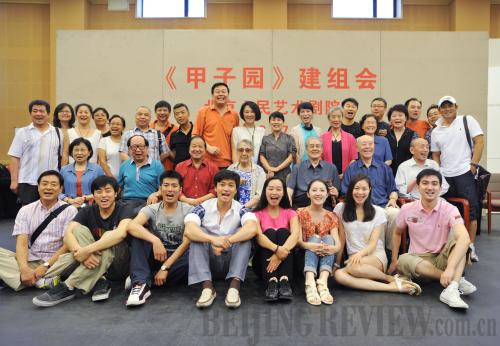|
 |
|
BIG FAMILY: The cast of Jia Zi Yuan, a drama performed by Beijing People's Art Theatre, pose for a group photo in Beijing on July 5, 2012 during a team-building ceremony (WEI YAO) |
This September, the best of China's youngest and oldest theater artists will perform side by side in a special drama called Jia Zi Yuan, featuring a cast with a wide range of experience—from new actors born in the 1990s to stage legends still active in their 90s.
The show will be produced by the Beijing People's Art Theatre (BPAT), China's top national theater company, at the Capital Theatre on the famously bustling Wangfujing Street.
"This is not only an artistic creation process composed of team building, rehearsal and performance, but also a lesson of passing on the spirit, working style and traditions of the company," said Zhang Heping, President of BPAT and artistic director of the drama.
The wide age gap of the performers gives the drama a deep sense of legacy. Founded on June 12, 1952, by drama master Cao Yu (1910-96), the theater has produced nearly 300 dramas of differing styles, entertaining audiences both at home and abroad. This year marks its 60th anniversary, and drama will play a central role in the celebration of this special moment.
BPAT was first established in 1950, in the second year after the People's Republic of China was established. At that time, it was a comprehensive art group consisting of opera, drama and dance.
Later on in 1952, the organization joined forces with the Central Academy of Drama (CAD), and the two together formed BPAT.
The newly established body was not the only member of the Chinese drama family, but came to be seen as the most dynamic one.
In the 1950s, many Chinese provinces and municipalities started their own local art theaters, including Liaoning Province, Tianjin, Shanghai and others. None of them, however, has had long-lasting success. Shanghai People's Art Theatre closed several years ago, while those in Liaoning and Tianjin shifted to producing TV series in the 1980s, putting on few stage performances in recent years.
In contrast, BPAT has persistently thrived. With a group of top actors and playwrights, it has continuously put on high-quality performances both in China and overseas. Many of their productions have won state-level awards, leaving their counterparts far behind.
In July of this year, it presented 19 performances in Shanghai within half a month. The shows were so popular that tickets sold out three months in advance.
Its major stage, of course, is in its home base of Beijing at the Capital Theatre. It has long been a cultural landmark and revered center of the arts for Beijing and the whole country, much like the Bolshoi Theatre for Russia and the John F. Kennedy Center for the United States.
For Chinese drama professionals, it is the bastion that defends and promotes national theater arts, and the cultural landmark that best exemplifies this art form in the country. For audiences, it is a place portraying beautiful expressions of life.
At the rehearsal hall of the Capital Theatre, there hangs a work of Chinese calligraphy with the four characters Xi Bi Tian Da—"Art always comes first." The phrase was championed by founder Cao Yu, who has been described as China's Shakespeare by the British media.
"BPAT has a rich history, but more important is the artists' deep love and persistent pursuit for the art of drama," said the drama master a year before he passed away.
Placing art above all strikes at the core of their spirit. The theater has exercised this motto with careful devotion.
| 